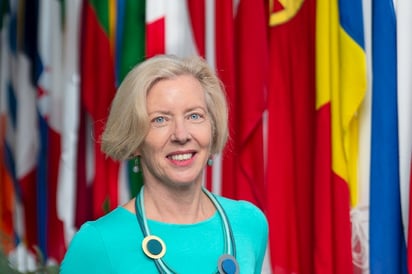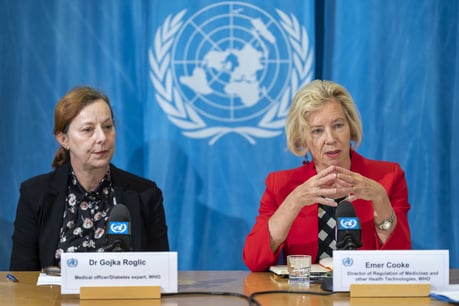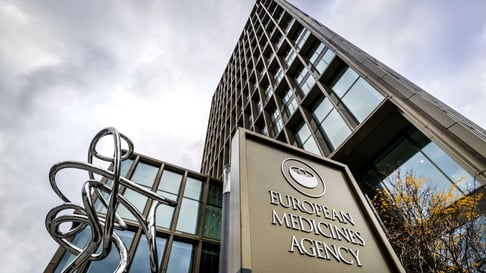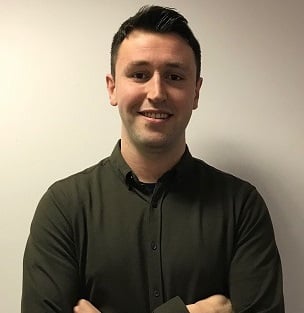Emer Cooke, MBA Alumna from the Class of '91, is the first woman to head the European Medicines Agency (EMA), one of the most powerful regulators in the world, with the added task of leading during a global pandemic. In this interview, Emer talks about taking on such a large responsibility in a time of crisis, cause for optimism on Covid-19, and the impact of Trinity on her career.

MBA Alumna Emer Cooke
Standing on the front steps of Trinity College Dublin in her MBA graduation robes nearly twenty years ago, Emer Cooke could not have foreseen the future that lay in front of her where she would one day be leading the European medical response to a global pandemic, one which has shown no sign of abating.
It’s fair to say that these weren’t the first months anyone could expect in a new position as executive director of the European Medicines Agency (EMA), but with over thirty years’ experience in international regulatory affairs, eighteen of which were in leadership roles – such as Director responsible for medicines regulation at The World Health Organization (WHO) – Emer is a proven leader and one who was ready to undertake such a serious challenge.
“I’ve been lucky to have had a really varied career after leaving Trinity, being able to experience so many different sides of the European and global pharmaceutical sector. In addition to my early career at the Irish Regulatory Authority, I’ve worked for the European pharmaceutical industry trade body at the European Commission and I’ve already spent 14 years at the European Medicines Agency in different roles. The past four years at WHO really expanded my global outlook. Of course, being the third in a family of seven high achievers meant I learnt all about cooperation and collaboration at an early age, with the occasional additional spice of competition.”
Learning to Lead
Along with this, Emer’s educational background includes a bachelor’s degree in pharmacy, as well as master’s degrees in science and business administration, all from Trinity College Dublin. Trinity thus holds a pivotal place in her life, having been a home of hers for seven educational years.
“Looking back, my Trinity pharmacy degrees gave me a really solid foundation on scientific development that prepared me to deal with the multi-disciplinary aspects of my day-to-day work. I also believe that The Trinity MBA helped me prepare for a career in management, especially to develop my leadership skills. I suppose I was already putting those into practice at Trinity as leader of DUPSA (Dublin University Pharmaceutical Students Association). I remember organising a trip to Switzerland including a visit to WHO – who could have imagined that years later I would be the one speaking to visiting students!”
 Emer in her previous role as Director of Regulation of Medicines and other Health Technologies, WHO
Emer in her previous role as Director of Regulation of Medicines and other Health Technologies, WHO
Having taken over the top job as executive director at the European Medicines Agency (EMA) in November 2020 with the pandemic front and centre, Emer is suddenly leading the agency at a crucial time. She finds herself overseeing the scientific scrutiny of new medicines, particularly a number of potential Covid-19 vaccines, and very much under public and political scrutiny.
“It’s such a huge responsibility to come to this position and know you have to do the right thing for the European public. Managing the pandemic response though comes on top of managing the relocation of the Agency and hundreds of staff and their families from London to Amsterdam. And it’s not just the EMA by itself, we work really closely with authorities in all the Member States. Managing such a huge European cooperation is complex at the best of times but everybody working remotely also brings extra challenges.”
Trusting a Vaccine
No news is normally good news, but with the recent announcement that the EU has done an advance deal for six vaccines, there is cause for real optimism. Emer echoes this, saying that the EMA could be in a position to approve new vaccines before the end of the year.
“Regulators everywhere from Ireland’s HPRA here, right across Europe to Romania and Cyprus are working together. It’s all about taking the right decision at the right time when we have the data, bringing together hundreds of experts from across the EU.
But approval of these vaccines isn’t the end of the story, we are also building in how to monitor safety to make sure that the vaccines do what they are supposed to do in the safest way possible. It’s so important that people trust the vaccines and the regulation we are working on. It’s why we are engaging with patients, the public and other wider civil society. For example, we organised a public meeting in December to talk about this and invited dialogue from civil society. We need to ensure the public have reliable sources of trusted information.”
 The European Medicines Agency Headquarters
The European Medicines Agency Headquarters
Looking to the Future
Today, Emer remains positive about the future of global health and the ability of countries to work together towards a common goal, as has been the case in the past year where countries have pulled together. She reflects on this, and on the coming years where implementation of a Covid-19 vaccine will need to take place globally, along with other medicine.
“Vaccines are not by themselves the silver bullet. Managing COVID-19 will need an effective ‘test-treat-prevent’ approach with vaccines, therapeutics and diagnostics all having a role. More than anything though, I really hope that some of the advances we’ve seen in the speed of innovation for COVID-19 can be translated into other areas where there are other real patient needs.
The pandemic has highlighted something else that is really important to me: ensuring availability of and access to medicines and medical devices and supporting expedited access to innovation where there is an unmet need. In the end it doesn’t matter how innovative or how basic a medicine is if it doesn’t reach the patient, for whatever reason. It isn’t something that EMA can do alone, but I believe we need to focus more attention on this.”


